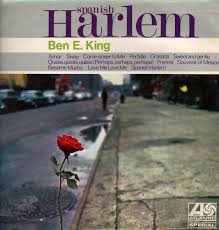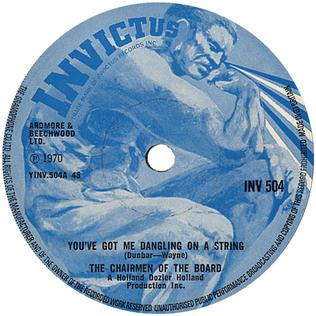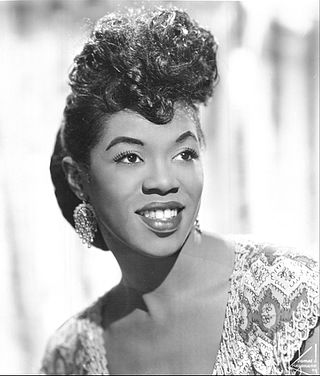Related Research Articles

"Get Ready" is a Motown song written by Smokey Robinson, which resulted in two hit records for the label: a U.S. No. 29 version by The Temptations in 1966, and a U.S. No. 4 version by Rare Earth in 1970. It is significant for being the last song Robinson wrote and produced for the Temptations, due to a deal Berry Gordy made with Norman Whitfield, that if "Get Ready" did not meet with the expected degree of success, then Whitfield's song, "Ain't Too Proud to Beg", would get the next release, which resulted in Whitfield more or less replacing Robinson as the group's producer.

"Spanish Harlem" is a song recorded by Ben E. King in 1960 for Atco Records. It was written by Jerry Leiber and Phil Spector and produced by Jerry Leiber and Mike Stoller. "Spanish Harlem" was King's first hit away from The Drifters, peaking at number 15 on Billboard's rhythm and blues and number 10 in pop music chart.
"Teach Me Tonight" is a popular song that has become a jazz standard. The music was written by Gene De Paul, the lyrics by Sammy Cahn. The song was published in 1953.

"Chain Gang" is a song by American singer-songwriter Sam Cooke, released as a single on July 26, 1960.

"Go Away Little Girl" is a popular song written by Gerry Goffin and Carole King. It was first recorded by Bobby Vee for Liberty Records on March 28, 1962. The lyrics consist of a young man asking a young attractive woman to stay away from him, so that he will not be tempted to betray his steady girlfriend by kissing her. The song is notable for making the American Top 20 three times: for Steve Lawrence in 1963, for The Happenings in 1966, and for Donny Osmond in 1971. It is also the first song, and one of only nine, to reach US number 1 by two different artists. Also notable in each of the solo versions is the similar double-tracked treatment of the singer's voice.

"(You've Got Me) Dangling on a String" is a 1970 soul music song by the Chairmen of the Board. The single reached No. 38 on the US Billboard Hot 100, No. 19 on the US Billboard R&B chart, and No. 5 on the UK Singles Chart. Ronald Dunbar and Edythe Wayne wrote the song.
"It's Ecstasy When You Lay Down Next to Me" is a hit song by American singer Barry White. The song was written by Ekundayo Paris and Nelson Pigford, and arranged by Barry White.

"Take Me in Your Arms (Rock Me a Little While)" is a song written by the premier Motown songwriting/production team of the 1960s Holland–Dozier–Holland. The first hit recording was sung by Kim Weston in 1965. It was most popular in 1975 when it was recorded by the Doobie Brothers.

"Love Ballad" is a song by R&B/Funk band L.T.D. Jeffrey Osborne is the lead singer.
"Trust in Me" is a song written by Ned Wever, Milton Ager, and Jean Schwartz. Popular versions in 1937 were by Mildred Bailey and by Wayne King & his Orchestra.

"Cupid" is a song by American singer Sam Cooke, released on May 16, 1961. It charted at number 17 on the Billboard Hot 100 and number 20 on the Hot R&B Sides chart; the track performed best in the United Kingdom, peaking at number seven on the UK Singles Chart. The song is featured on Cooke's greatest hits album, The Best of Sam Cooke (1962). Cooke's producers had asked him to write a song for a girl they had seen on a Perry Como TV show—but once they heard her sing, they kept "Cupid" for Cooke himself.
"Stop to Love" is a song by American recording R&B/soul artist Luther Vandross. Released in 1986 as the lead single from his album Give Me the Reason. It was his first number-one single on the R&B chart since "Never Too Much" in 1981. The upbeat single was also a crossover hit, peaking at number fifteen on the Billboard Hot 100.

"A Rockin' Good Way (to Mess Around and Fall in Love)" is a song first recorded in 1958 by Priscilla Bowman, on the Abner Records label (ABNER DJ 1018). Bowman was given vocal backing by The Spaniels.
"A Woman, a Lover, a Friend" is the 1960 follow up single to "Doggin' Around" performed by Jackie Wilson. Just as its predecessor, the single made it to number one on the R&B charts, where it stayed at the top spot for one month. "A Woman, a Lover, a Friend", also charted on the Hot 100 peaking at number fifteen.
"A Lover's Question" is a 1958 Pop, R&B hit for Clyde McPhatter. The single was written by Brook Benton and Jimmy T. Williams and was Clyde McPhatter's most successful Pop and R&B release. The bass singer is Noah Hopkins. "A Lover's Question" made it to #6 on the Billboard Hot 100 and was #1 for one week on the R&B chart.
"Reach Out for Me" is a 1963 a song written by Burt Bacharach and Hal David and originally recorded by Lou Johnson. In the US, the original version peaked at number seventy-four on the Billboard Hot 100 the week ending December 7, 1963.
"Funny How Time Slips Away" is a song written by Willie Nelson and first recorded by country singer Billy Walker. Walker's version was issued as a single by Columbia Records in June 1961 and peaked at number 23 on the Hot C&W Sides chart. The song has been featured in several live action films and television shows, such as in the first episode of the second season of AMC’s Better Call Saul and in the 2020 Netflix drama The Devil All the Time.
"Don't Let Go" is a song written by Jesse Stone. The song was first a hit for Roy Hamilton in 1958. The Roy Hamilton version reached number 2 on the R&B charts and number 13 on the pop charts.

"Take Good Care of Her" is a 1961 song written by Arthur Kent and Ed Warren and recorded by Adam Wade. It reached number twenty on the R&B charts and number seven on the Hot 100. In the song, the narrator speaks to the groom of his ex-girlfriend.

The singles discography of American Jazz artist Sarah Vaughan contains 89 singles, two promotional singles and seven other charted songs. Vaughan recorded her first singles in 1946, with her first release being "If You Could See Me Now". Soon after, she saw her first major chart success on the Billboard pop list with "Tenderly" and "It's Magic." Moving to Columbia Records, she had further pop hits in the late 1940s with covers of "Black Coffee" and "Nature Boy." She had her second top ten hit in 1950 with "(I Love the Girl) I Love the Guy." Vaughan moved to Mercury Records during the 1950s and recorded more pop music. At Mercury, she had her biggest chart success, with the top ten hits "Make Yourself Comfortable" and "Whatever Lola Wants." In 1959, Vaughan's single "Broken Hearted Melody" reached number seven on the Billboard pop chart and became an international success, becoming the biggest single of her career.
References
- ↑ Whitburn, Joel (2004). Top R&B/Hip-Hop Singles: 1942–2004. Record Research. p. 629.
- ↑ Whitburn, Joel (2004). Top R&B/Hip-Hop Singles: 1942–2004. Record Research. p. 329.